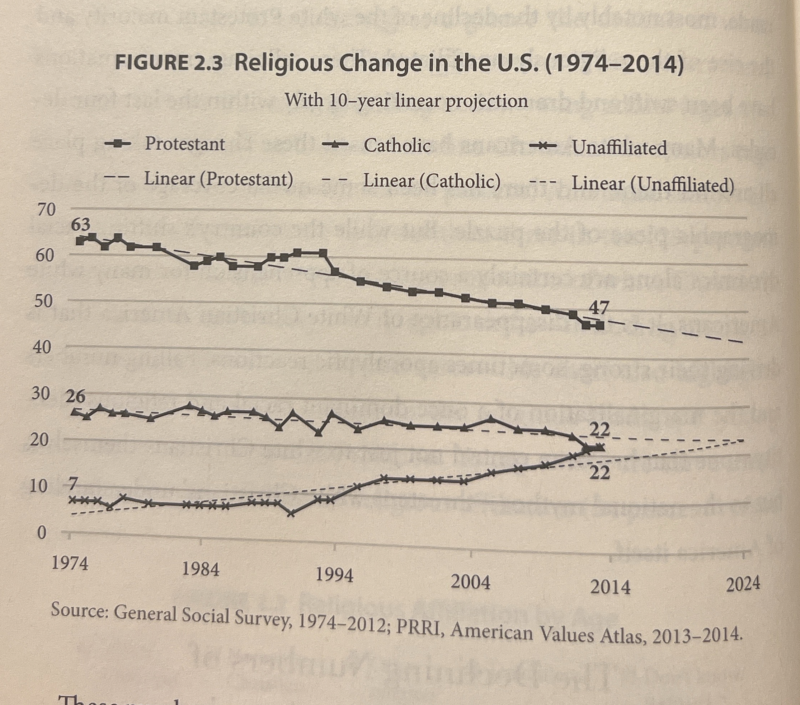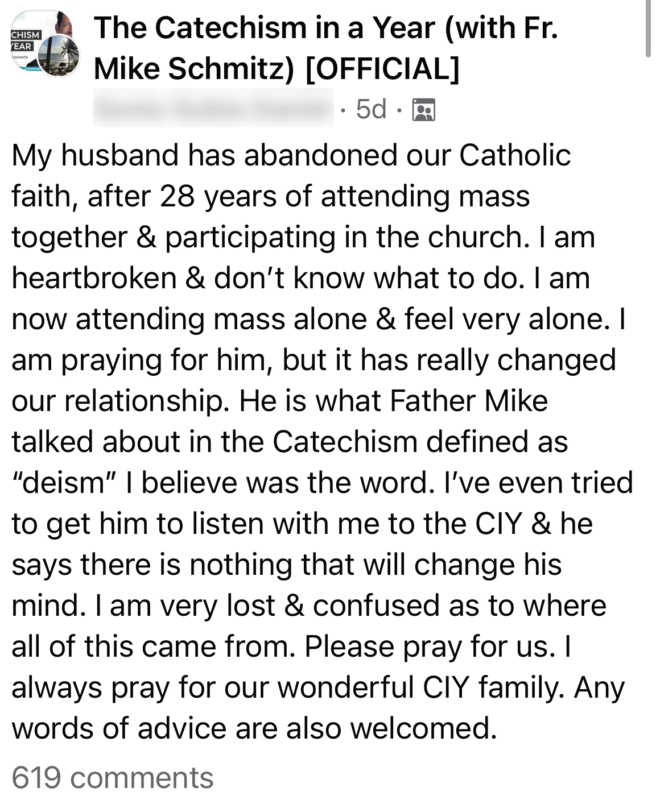“Deconstruction” is the current term for deconverting from Christianity. I’m sure it’s applicable to other religions, and I know not all people who deconstruct end up abandoning their faith altogether, but by and large, the end result of deconstruction is a new skeptic.
The Christian response to this has fallen into a few categories:
- They deny that the person was ever a true Christian to begin with.
- They blame the churches for incomplete catechesis.
- They play down the deconversions by calling them silly or suggesting that their objections are basic and even juvenile.
- They suggest that the new skeptic “just wants to sin.”
- They blame the parents for not teaching their children their faith well enough.
- They suggest that de-conversions do not result in a lack of faith but rather a change in where the faith is placed.
Occasionally, a Christian response can’t quite decide which tack to take and simple mixes and matches responses. Such is the case with Grayson Gilbert’s “I’m Not All That Impressed with Exvangelical Deconstruction Stories” from a couple of years ago.
Gilbert begins condescendingly enough by referencing the “never-ending supply of pastors, pastor’s kids, and artists formerly known as Christians” who are leaving the faith. There may be a number of “grand excuses,” Gilbert suggests, but he insists that the “fundamental issue behind every one of these de-conversion stories” is the fact that, as the Bible explains in I John 2.15, they “went out from us, but they were not of us.”
Gilbert pretends to preempt objections in the next paragraph by acknowledging that for many it’s not an inadequate answer because “it’s a bit too Calvinistic.” That’s a very theologically based objection, firmly grounded in an acceptance of the basic tenants of Christianity and quibbling over details, but most skeptics’ objections would be to question the validity of Gilbert’s and St. John’s foundational assumption: they left Christianity because they were never really Christian.
Forget for a moment how utterly and arrogantly childish it is to suggest that, despite skeptics’ protestations to the contrary, these true Christians can read the mind and know the intentions of those who have rejected Christianity. The truth of the issue is simple: most people who leave Christianity do so reluctantly. They want to believe, but they find they no longer can. Evidence and arguments that once convinced them no longer do. But for a Christian still in the fold, the thought that someone who is a true Christian (how Christians love to be gatekeepers with each other) could lose their faith is terrifying because it means if someone else lost their faith, they could, too. To allay these fears, the only option is to suggest that these individuals never were really Christian in the first place.
Gilbert then deals with a particularly famous ex-evangelical, Abraham Piper, who is the son of John Piper, a Protestant theologian who has written a number of books and runs a successful online ministry in addition to his real-world church. Gilbert points out that “Abraham has taken a fancy to TikTok with clever, catchy tidbits of him mocking the Christian faith.” That sentence is just dripping with derision: Abraham’s efforts online to point out the flaws he sees in Christianity are not a serious work but instead “a fancy.” His succinct observations are merely “catchy tidbits” unworthy of serious consideration. And he is not critiquing Christianity, which would require a measured response; he’s mocking Christianity, which can be easily dismissed and forgotten.
In a parenthetical remark, Gilbert suggests that mocking Christianity “is so in vogue today.” Never mind that this is not a question of popularity; what’s more significant is the notion that critics are merely “mocking” the Christian faith, much like childish bullies mock their victims. It produces the victim complex that Christians expect from exhortations in the Bible, and it downplays the seriousness of the critiques themselves. Christian theology has caused real-world pain and done significant damage in a lot of people’s lives. It has destroyed self-confidence in its near-continual insistence that humans are worthless trash. It has caused untold damage in its institutional misogyny and homophobia. It has literally killed thousands upon thousands in religious wars. It threatens the planet with its denial of science. It stifles critical thinking and encourages blind faith obedience. Leaving this mindset can produce a sense of relief, but if this is something that the new skeptic’s parents taught them, something that’s been a central pillar in their life for so long, there can be understandable anger arising as a result. Gilbert explains he uses some of Abraham Piper’s videos to discuss “the nature of the Proverbial fool” with his son, thus attempting to ensure that his son instinctively reacts as he does without giving further thought to the motives or reasoning behind a de-conversion.
Far from the fact that the son of a celebrated and admired pillar in the Evangelical community has left the faith might depress Gilbert, he insists that he now has “a deeper appreciation for John Piper. “It led me to see that despite Abraham’s brutal mockery of all his father and mother stand for and love, it testifies of his paternal faithfulness,” he insists.
How does Gilbert square this round hole? He explains that it is a sign of “the faithfulness of a man like John Piper in raising his son to be so inundated with biblical truth that he still can’t quite get away from it well into his adult life. It is constantly on the tip of the tongue; he cannot go about life without thinking of the God he professes to reject.” This is an attempt, in other words, to turn a loss into a win. Gilbert doesn’t consider the possibility that the reason Abraham Piper is critiquing Christianity online is to try to help people who are facing the pain and frustration that rigid, fundamentalist Christianity can inflict (see above). Notice, too, the wording: “the God he professes to reject.” This is a not-so-subtle dig at Piper through a subtle allusion to Romans 1:20:
For ever since the world was created, people have seen the earth and sky. Through everything God made, they can clearly see his invisible qualities—his eternal power and divine nature. So they have no excuse for not knowing God.
Abraham doesn’t really reject it, in other words. He knows there’s a god — he just wants to sin.
Still, even if John Piper had not been a good Christian parent, it’s not his fault if his son rejects faith (and thereby condemns himself, in the Christian view, to hell):
Many a parent neglected to make the Word central in the home, raised their children to be good, obedient pagans, and then wondered why their children came back from school with all sorts of ideas that run contrary to the Christian faith. The onus is still on these children to search out the truth of Scripture, regardless of how bad a job mom and dad have done.
As a skeptic, I have to wonder how one could worship a god that creates such a confusing book that requires a library of explanation and commentary to understand and then sends you to hell if you don’t understand it properly. That’s probably something along the lines of what some of these de-conversion experiences went through as well.
Soon after this, Gilbert switches his argument and employs the “well, everyone is religious” suggestion: the “Religious Nones” are in fact misnamed: “everyone is a devotee to some belief system, whether agnostic, atheistic, or the ever-vague “spiritualistic but not religious” group.” It’s funny how “religious” becomes something of an insult in this case.
Finally, after tossing this argument and that argument at the idea of de-conversion, Gilbert launches his main attack:
I’ve come to be more and more convinced that the vast majority of those who reject the Christian faith do so on the basis of intellectual laziness, intellectual dishonesty, or simple ignorance. They either don’t care to find the answers, they don’t care to hear the answers, or, they don’t know where to even begin.
He classifies the case various ex-Evangelicals have leveled against Christianity thusly:
The objections that people like Rhett and Link, Abraham Piper, the Gungors, Newboys’ former member George Perdikis, dc Talk’s Kevin Max, Joshua Harris, Derek Webb, et al., have, are basic, Sunday school level objections. In where we are in the history of the church, these aren’t even the interesting questions that Christians have any more. These are some of the most basic elements of the historic Christian faith that it leaves many of us wondering if these people took much time at all to crack open some dusty, old tomes from dead guys on the subjects.
This is because for
anyone who has taken the time to actually study these things in depth, the question isn’t if someone has given a satisfying answer to reconcile the apparent contradictions of the Scriptures, given exhaustive treatment on things like textual criticism and transmission, or provided ample solutions to the “problem passages” we find as finite readers.
In other words, they reject Christianity because they are lazy, and even though all the answers to all their objections have been covered time and time again, they reject them in their ignorance. In still other words, they haven’t read the right books, and indeed they probably haven’t even looked for the right books.
Speaking as someone who has done the reading and looked for the answers, I can simply say this: it is entirely possible that someone can start questioning their faith, look for and find answers to their questions, and find those answers unconvincing. We cannot choose what ideas convince us and what ideas don’t, and to suggest that the only other alternative is ignorance or laziness sloppy argumentation at best and simple vilification at worst.
But in the end, that’s to be expected when we consider the intended audience. Gilbert is not seeking to convince wayward Christians of the errors of their ways; he’s soothing the worried faith of those who worry that they in turn might find their Christian faith lacking. If someone like Abraham Piper can reject Christianity, anyone can. But not us, assures Gilbert. We’re real Christians; we know that no matter the objection, there’s an answer for it out there. Notice, though, that Gilbert didn’t rehearse any of the objections or their answers. He simply swept them all away with an easy flick of the wrist: the answers are out there. Surely they’re convincing…


























